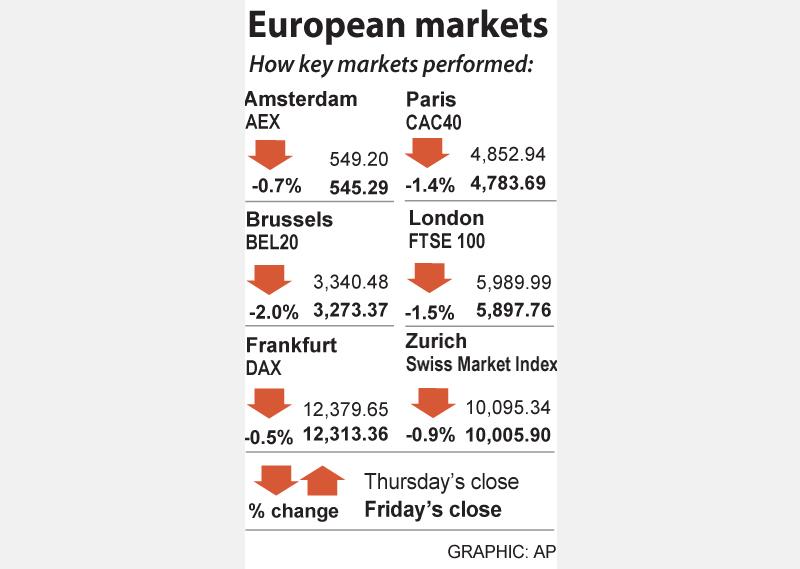European stocks on Friday posted their first monthly decline since a market sell-off in March as growing doubts over a global recovery from the COVID-19 crisis overshadowed a batch of strong earnings from technology firms.
The pan-European STOXX 600 gave up early gains to close 0.89 percent lower at 356.33, pressured by a weak open for Wall Street as optimism from stellar earnings reports from big tech names Amazon.com Inc, Apple Inc and Facebook Inc faded.
The index lost 2.98 percent over the week.

An early reading of the euro zone’s economy showed the bloc shrank by a bigger-than-expected 12.1 percent in the second quarter, its deepest contraction on record as lockdowns ravaged business activity.
Spain’s benchmark index dropped 1.7 percent as the country posted the worst output slump, while GDP in Italy and France also fell sharply, but less than forecast.
“Lockdown exits coupled with massive stimulus brought a strong rebound in activity during Q2, which supported the rally in equities, but recovery appears to be leveling off,” equity strategists at Barclays PLC wrote in a note.
“Overall, choppy markets could continue due to elevated uncertainty, low conviction and tight summer liquidity.”
The STOXX 600 was down about 1 percent last month, with fears of a resurgence in COVID-19 cases also weighing on the mood as Britain imposed a tougher lockdown in swathes of northern England, while Spain saw a surge in new infections.
Technology stocks were among the few gainers, up 0.7 percent after forecast-beating results from Wall Street’s tech majors on Thursday.
The top gainer on the STOXX 600 was Finnish telecom network equipment maker Nokia, up 12.5 percent after reporting an unexpected rise in underlying profit as it reduced low-margin business.
“The strength of numbers from the ‘four horsemen of tech’ is leading to a halo effect for the tech sector and a resumption of growth stocks leading the market,” said Neil Campling, head of technology, media and telecommunications research at Mirabaud Securities. “Nokia results also help sentiment as the key for the equipment stocks is always on margins to get a sense of pricing.”
BNP Paribas SA rose 0.8 percent as it earned a higher-than-expected quarterly profit, boosted by a surge in fixed income trading and strong demand for corporate finance.
Nearly 50 percent of the companies listed on the STOXX 600 have reported quarterly earnings so far, and 64 percent of those have surpassed beaten-down profit expectations, Refinitiv data showed.
Meanwhile in London, the FTSE 100 erased session gains to end at a 10-week low.
The FTSE 100 ended down 1.54 percent after having gained as much as 1.7 percent during the day when upbeat earnings from British American Tobacco and Glencore had lifted the index.
However, both stocks later gave up gains, down 5 percent and 1.4 percent respectively, as sentiment turned, after fears that a nascent economic recovery might reverse were triggered by the stricter lockown measures.
The index dropped 3.69 percent from a week earlier.

Taiwan Semiconductor Manufacturing Co (TSMC, 台積電) last week recorded an increase in the number of shareholders to the highest in almost eight months, despite its share price falling 3.38 percent from the previous week, Taiwan Stock Exchange data released on Saturday showed. As of Friday, TSMC had 1.88 million shareholders, the most since the week of April 25 and an increase of 31,870 from the previous week, the data showed. The number of shareholders jumped despite a drop of NT$50 (US$1.59), or 3.38 percent, in TSMC’s share price from a week earlier to NT$1,430, as investors took profits from their earlier gains

In a high-security Shenzhen laboratory, Chinese scientists have built what Washington has spent years trying to prevent: a prototype of a machine capable of producing the cutting-edge semiconductor chips that power artificial intelligence (AI), smartphones and weapons central to Western military dominance, Reuters has learned. Completed early this year and undergoing testing, the prototype fills nearly an entire factory floor. It was built by a team of former engineers from Dutch semiconductor giant ASML who reverse-engineered the company’s extreme ultraviolet lithography (EUV) machines, according to two people with knowledge of the project. EUV machines sit at the heart of a technological Cold

Taiwan’s long-term economic competitiveness will hinge not only on national champions like Taiwan Semiconductor Manufacturing Co. (TSMC, 台積電) but also on the widespread adoption of artificial intelligence (AI) and other emerging technologies, a US-based scholar has said. At a lecture in Taipei on Tuesday, Jeffrey Ding, assistant professor of political science at the George Washington University and author of "Technology and the Rise of Great Powers," argued that historical experience shows that general-purpose technologies (GPTs) — such as electricity, computers and now AI — shape long-term economic advantages through their diffusion across the broader economy. "What really matters is not who pioneers

TAIWAN VALUE CHAIN: Foxtron is to fully own Luxgen following the transaction and it plans to launch a new electric model, the Foxtron Bria, in Taiwan next year Yulon Motor Co (裕隆汽車) yesterday said that its board of directors approved the disposal of its electric vehicle (EV) unit, Luxgen Motor Co (納智捷汽車), to Foxtron Vehicle Technologies Co (鴻華先進) for NT$787.6 million (US$24.98 million). Foxtron, a half-half joint venture between Yulon affiliate Hua-Chuang Automobile Information Technical Center Co (華創車電) and Hon Hai Precision Industry Co (鴻海精密), expects to wrap up the deal in the first quarter of next year. Foxtron would fully own Luxgen following the transaction, including five car distributing companies, outlets and all employees. The deal is subject to the approval of the Fair Trade Commission, Foxtron said. “Foxtron will be